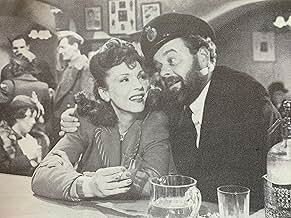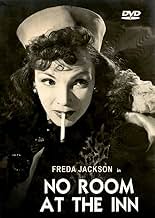अपनी भाषा में प्लॉट जोड़ेंTwo children are evacuated during World War Two into the care of an alcoholic woman.Two children are evacuated during World War Two into the care of an alcoholic woman.Two children are evacuated during World War Two into the care of an alcoholic woman.
- निर्देशक
- लेखक
- स्टार
Marie Ault
- Vicar's Maid
- (बिना क्रेडिट के)
Vera Bogetti
- Barmaid
- (बिना क्रेडिट के)
फ़ीचर्ड समीक्षाएं
I saw this film when I was very young and it had the most amazing effect on me. My Mother took me to the cinema I think not realising that it was to be so disturbing. I now work in the caring industry and have a highly developed sense of justice, fairness and the importance of treating people as you would wish to be treated yourself which I attribute largely to this film. I will never forget it - it is the most haunting film I have ever seen. I would really love to be able to see it again from my adult perspective but cannot find it. Can anyone tell me where I might get a copy? If I had to chose one scene which affected me most it would have to be when one of the children was locked in the outside coal shed - I am now a claustrophobic and can't bear to be shut in anywhere! What a legacy to have been left by a film!!
A full-blooded post-War British melodrama set during World War 2, adapted from a stage play, co-scripted by Dylan Thomas and directed by Daniel Birt (see also THE THREE WEIRD SISTERS) and starring hatchet-faced Freda Jackson as wicked landlady Mrs Voray who takes in orphaned children and spends their allowance on drink and finery. Narrated in flashback by Mary O'Rane (Ann Stephens) as she recalls the experiences that turned both her and fellow orphan Norma Bates (get that name!), played by feisty Joan Dowling, into petty thieves, this has apparently been considerably opened out by co-scripter Thomas, to take in a less than thinly veiled attack on Church and State, as well as the kind of class hypocrisy that allowed middle-class types to tut-tut behind their net curtains at the dirty-faced urchins and carousing working-class slatterns, whilst simultaneously cooking up barely credible excuses not to take the hapless youngsters in; even when begged by a selfless and community-spirited young schoolmistress. Described at the time by 'Today's Cinema' as a '...completely sordid canvas...' and a work of '...cruelty which has no parallel on British screens...', this was clearly strong meat in its day and, even though time has dimmed much of its initial power and rendered some of its sentiment a shade sugary, its theatrics a trifle hammy and its portentous religious overtones somewhat trite and banal, this is still an undeniably downbeat tale of often almost Victorian squalor. Partially leavened by occasional shafts of wit (e.g. Voray recalls her ex-husband 'Nobody bothered about his family tree - except the dogs'), humorous comic stereotypes and sharp-tongued kids, this still packs a fair wallop; thanks in no small measure to Jackson's vividly etched turn as the kind of vicious and spiteful harridan who appears to have stepped out of a tale by the Brothers Grimm. Definitely worth a look for those interested in the often overblown, but nevertheless entertaining, school of post-War British genre cinema.
I saw this film years ago as a child and it stuck in my memory, so when it appeared on TV on the Talking Pictures channel, I watched it again. Of course some of the acting is over the top, tipping into caricature. But the children are brilliant. Joan Dowling steals the film and it is sad that she committed suicide in the early fifties, as she had so much to give. An aunt had tales to tell of similar experiences as an evacuee and there is a moral to the film as the do gooders turn a blind eye when asked to help. The denouement is a bit mellow dramatic and the film ends suddenly which is a bit odd, especially as the story is told in flashback, one of the children as an adult is recounting it. We needed a bit more of the scenes from the beginning revisited at the end. Still I enjoyed seeing it again.
I saw this film for the first time very recently at the Mediatheque at the BFI in London and was stunned by the film itself, and the excellent performances of Freda Jackson and Joan Dowling in particular.
"No Room At The Inn" was originally a stage play by Joan Temple in which Freda Jackson scored an immense success as the despicable Mrs Voray. The play opened at the Embassy Theatre in London in 1945, and Miss Jackson repeated her triumph the following year at the Winter Garden Theatre.
The film's screenplay, based on Temple's play, was co-written by the producer Ivan Foxwell and the celebrated Welsh writer Dylan Thomas, and their skill shines through. The treatment in many ways is surprisingly modern, as is much of the acting. Although the denouement is somewhat melodramatic, the film remains hugely powerful and entertaining. It is also darkly disturbing, and reveals that today's appalling stories of child abuse beloved by the tabloids are nothing new at all.
Other British character actors supply memorable performances. We see Hermione Baddeley in one of her grotesque frowsy harridan roles - her character in "It Always Rains On Sunday" with large knobs on - Sydney Tafler as a dapper spiv, and good old stalwart Dora Bryan (sans ubiquitous plastic mac) as his girlfriend. Tafler's wife, Joy Shelton gives a strong performance as the teacher of Mary O'Rane, who in turn is played by Ann Stephens (familiar as the bad gal of "The Franchise Affair").
It is unquestionably Jackson's film, however, although the delicious Joan Dowling - brilliant as the amoral kid Norma Bates - gives her a run for her money. One wishes much more of Freda Jackson's work had been committed to celluloid.
Apparently the film is not currently available commercially, and I understand has not been shown on British TV since the 1950s. Another reviewer on here states that the BFI informed them it is "in private hands". I hope that this doesn't suggest that for some reason we may never have the opportunity of seeing this film in its entirety.
I have seen a copy of a 16mm version - not at the BFI - and as far as I am aware that is the only copy in any sort of circulation at present. However, I believe this was from a later release of the film that was cut down - (possibly to be part of a double feature?).
Unfortunately so severe is the truncation of this version that in parts it makes little sense, and indeed some of the very best scenes have been cut - for example Joan Dowling's magnificent "cockney" version of the Cinderella story. This scene alone shows this tragically short-lived actress at her very finest, and it is sorely missed.
The shortened version loses more than 30 valuable minutes I'm afraid, so to those who have never seen this film, I recommend - if it is at all possible - that you see the version held by the BFI - either at the Mediatheque, or on screen.
Meanwhile, I am keeping my fingers crossed for a release of the complete version on DVD in the not-too-distant future!
"No Room At The Inn" is a must-see for lovers of good 1940s British dramatic film.
"No Room At The Inn" was originally a stage play by Joan Temple in which Freda Jackson scored an immense success as the despicable Mrs Voray. The play opened at the Embassy Theatre in London in 1945, and Miss Jackson repeated her triumph the following year at the Winter Garden Theatre.
The film's screenplay, based on Temple's play, was co-written by the producer Ivan Foxwell and the celebrated Welsh writer Dylan Thomas, and their skill shines through. The treatment in many ways is surprisingly modern, as is much of the acting. Although the denouement is somewhat melodramatic, the film remains hugely powerful and entertaining. It is also darkly disturbing, and reveals that today's appalling stories of child abuse beloved by the tabloids are nothing new at all.
Other British character actors supply memorable performances. We see Hermione Baddeley in one of her grotesque frowsy harridan roles - her character in "It Always Rains On Sunday" with large knobs on - Sydney Tafler as a dapper spiv, and good old stalwart Dora Bryan (sans ubiquitous plastic mac) as his girlfriend. Tafler's wife, Joy Shelton gives a strong performance as the teacher of Mary O'Rane, who in turn is played by Ann Stephens (familiar as the bad gal of "The Franchise Affair").
It is unquestionably Jackson's film, however, although the delicious Joan Dowling - brilliant as the amoral kid Norma Bates - gives her a run for her money. One wishes much more of Freda Jackson's work had been committed to celluloid.
Apparently the film is not currently available commercially, and I understand has not been shown on British TV since the 1950s. Another reviewer on here states that the BFI informed them it is "in private hands". I hope that this doesn't suggest that for some reason we may never have the opportunity of seeing this film in its entirety.
I have seen a copy of a 16mm version - not at the BFI - and as far as I am aware that is the only copy in any sort of circulation at present. However, I believe this was from a later release of the film that was cut down - (possibly to be part of a double feature?).
Unfortunately so severe is the truncation of this version that in parts it makes little sense, and indeed some of the very best scenes have been cut - for example Joan Dowling's magnificent "cockney" version of the Cinderella story. This scene alone shows this tragically short-lived actress at her very finest, and it is sorely missed.
The shortened version loses more than 30 valuable minutes I'm afraid, so to those who have never seen this film, I recommend - if it is at all possible - that you see the version held by the BFI - either at the Mediatheque, or on screen.
Meanwhile, I am keeping my fingers crossed for a release of the complete version on DVD in the not-too-distant future!
"No Room At The Inn" is a must-see for lovers of good 1940s British dramatic film.
I was in the U.K.throughout the war, I was an evacuee. My treatment was just like this movie. I saw it when it first came out, I was 15 years old and had been working for a little over a year, in London. Although somewhat sad it was also very amusing. Films like this leave a lasting impression. I remember one line in particular when the small boy got hold of a hat and stuck it in the pitcher, the comment was "What happened to me Sailor Beware", it was a womens sailor hat.
If you have lived through a war, buzz bombs, being bombed out, you would not appreciate the artistry of this production as much as I did.
If you have lived through a war, buzz bombs, being bombed out, you would not appreciate the artistry of this production as much as I did.
टॉप पसंद
रेटिंग देने के लिए साइन-इन करें और वैयक्तिकृत सुझावों के लिए वॉचलिस्ट करें
विवरण
- चलने की अवधि
- 1 घं 22 मि(82 min)
- रंग
- पक्ष अनुपात
- 1.37 : 1
इस पेज में योगदान दें
किसी बदलाव का सुझाव दें या अनुपलब्ध कॉन्टेंट जोड़ें













